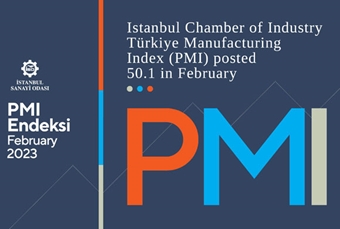News
February 2023 Report of ICI Türkiye Manufacturing PMI and Türkiye Sector PMI Released
- 01.03.2023
- News

The Istanbul Chamber of Industry Türkiye Manufacturing PMI, which is the fastest and most reliable reference accepted in manufacturing industry performance of the economic growth, was unchanged at 50.1 in February, pointing to broadly stable business conditions across the manufacturing sector during the month. And supplier lead times lengthened to the greatest extent in ten months as the earthquake caused difficulties in the sourcing and delivery of inputs. As well as impacting supply chains, the earthquake also caused a moderation in output in the sector as some firms paused output.
According to the Report of ICI Türkiye Sector PMI, output eased in nine out of ten sectors due to paused production lines of some firms in February. Only the base metal industry recorded growth, its highest pace in the past two years. Again due to the earthquake, delivery times of suppliers increased in all sectors except for food products and non-metallic mineral products.
The February 2023 period of Istanbul Chamber of Industry (ISO) Türkiye Manufacturing PMI (Purchasing Managers’ Index) survey, which is the fastest and reliable reference accepted in manufacturing industry performance of the economic growth was announced. According to the survey results where any figure greater than 50.0 indicates overall improvement of the sector, the headline PMI was unchanged at 50.1 in February, pointing to broadly stable business conditions across the manufacturing sector during the month. That said, the headline index was held above the 50.0 no-change mark by a marked lengthening of suppliers' delivery times, the index for which is inverted when calculating the overall PMI.
And supplier lead times lengthened to the greatest extent in ten months as the earthquake caused difficulties in the sourcing and delivery of inputs. As well as impacting supply chains, the earthquake also caused a moderation in output in the sector as some firms paused production. Still the output eased modestly, albeit at the second-slowest pace in a year.
New orders also moderated to a greater extent due to the earthquake, albeit one that was the secondweakest in 16 months. Both total new orders and new export business eased during February. Paused production lines and difficulties sourcing items led manufacturers to scale back their purchasing activity, with stocks of inputs also lower. Issues with supply and production meant that some firms turned to existing inventories to help meet order requirements. As a result, stocks of finished goods were depleted to the greatest extent since December 2021.
Rises in raw material costs and wages, plus currency weakness, led to a further marked increase in input prices during February. The rate of inflation was little-changed from January and broadly in line with the series average. In turn, output prices also rose sharply, albeit at a pace that was below the average seen across 2022.
Commenting on the Istanbul Chamber of Industry Türkiye Manufacturing PMI survey data, Andrew Harker, Economics Director at S&P Global Market Intelligence, said:
"The terrible earthquake in February impacted the Turkish manufacturing sector during the month, with supply chains and production lines affected i particular. Hopefully we will see signs of recovery in the affected areas and across the sector as a whole in the months ahead.”
Output rises in only one of the 10 monitored sectors
According to the February report of the Istanbul Chamber of Industry Türkiye Sectoral PMI, after seeing output growth in eight out of ten sectors in January, only one sector was able to increase its output in February due to the impact of the earthquake. The growth was limited to the base metal industry only, reaching its highest pace in the sector for the past two years. The second sharpest decline after the food products sector, which experienced the most significant contraction in output, was recorded in the electrical and electronic products sector.
The number of sectors that increased their new orders dropped to seven in January to three in February. On the other hand, new export orders increased in four sectors, primarily in machinery and metal products.
The second most affected PMI sub-index by the earthquake besides the output index was the supplier delivery times due to difficulties in sourcing and delivery. In February, delivery times increased in all sectors except for food products and non-metallic mineral products. The most significant delivery delays were experienced in the clothing and leather products sector, as well as land and sea vehicles industry.
Despite the negative impact of the earthquake on output, the majority of the sectors continued to create employment in February. The strongest increase in employment was observed in machinery and metal products, while the most significant decrease was in the textile sector, where output continued to decline. Input cost inflation witnessed a general decline in February. The increase in input prices gained momentum in only two sectors, namely clothing and leather products and land and sea vehicles, which were heavily affected by supply chain disruptions. By mid-Q1, the sales price inflation slowed down in many sectors, below the 2022 averages for all sectors.
You can find attached the Istanbul Chamber of Industry Türkiye Manufacturing PMI and Sector PMI February 2023 reports.